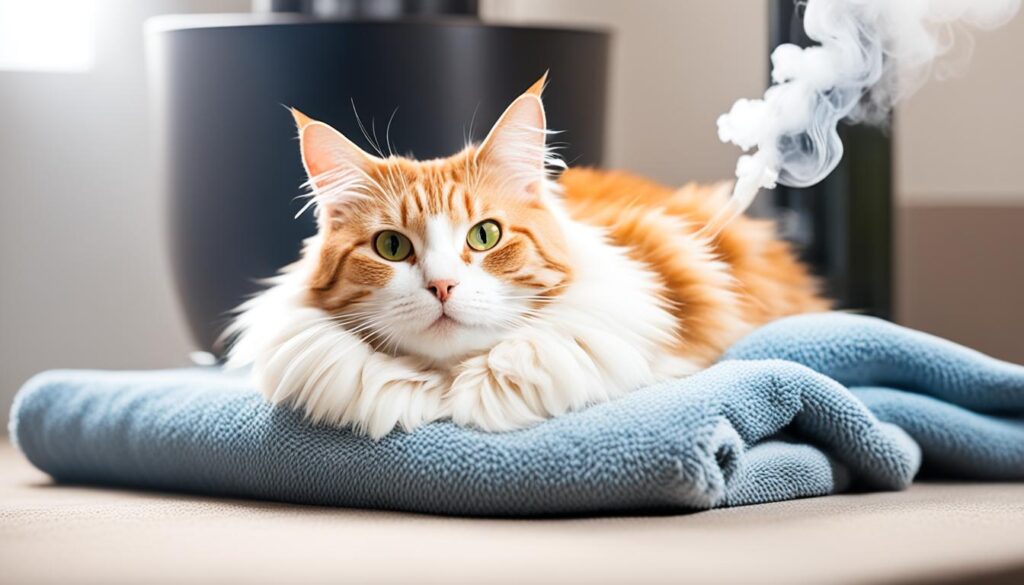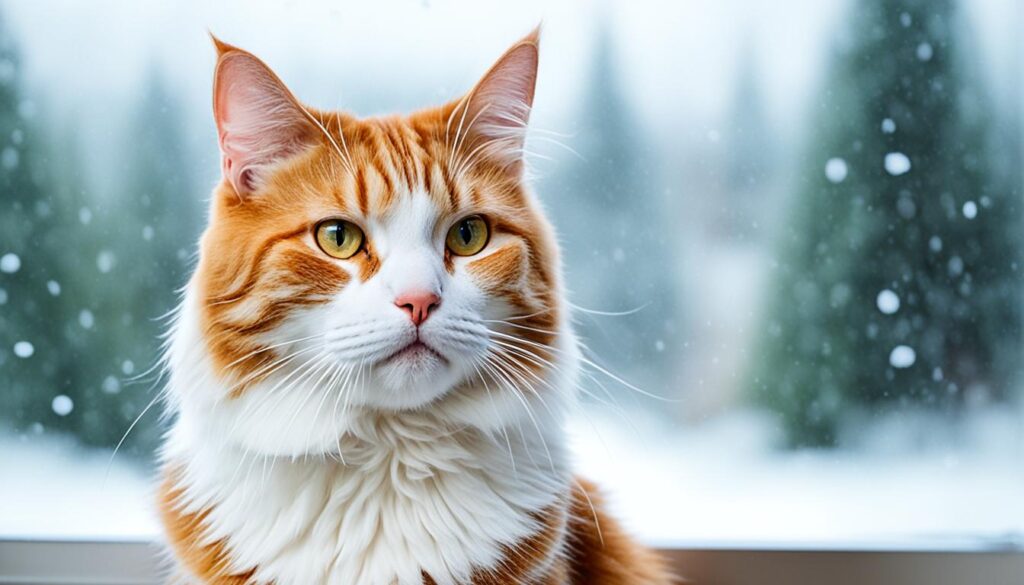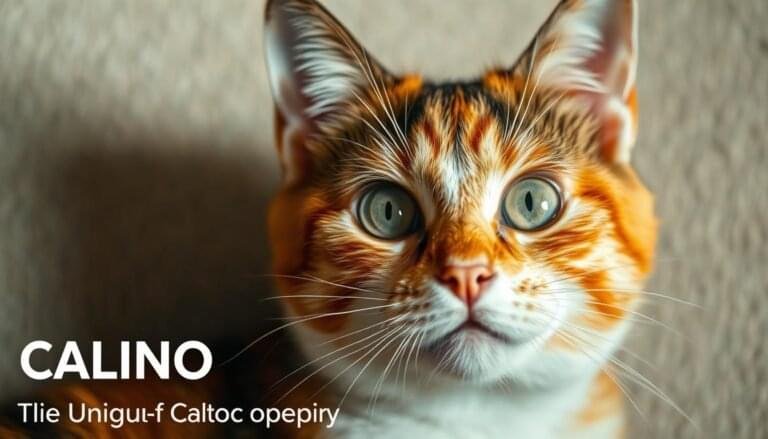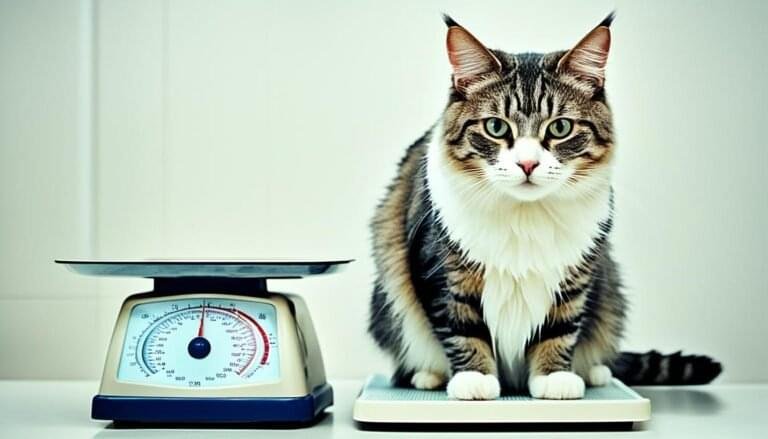How to Treat Cat with Runny Nose? Did you know that a cat cold, which includes symptoms like coughing, sneezing, and a runny nose, is similar to the common cold in humans? It’s true! Cats can experience respiratory infections caused by viruses such as the feline herpesvirus or feline calicivirus. These infections can make your furry friend uncomfortable and in need of relief. If you’re wondering how to treat a cat with a runny nose, we’ve got you covered with helpful tips and remedies to provide soothing relief.
How to Treat Cat with Runny Nose? Key Takeaways:
- Cat colds are respiratory infections that can cause symptoms like coughing, sneezing, and a runny nose.
- The most common causes of cat colds are the feline herpesvirus and feline calicivirus.
- Most cases of cat colds will resolve on their own, but severe cases may require medical treatment.
- Supportive care at home, such as humidifiers and reducing stress, can help alleviate symptoms.
- Consulting with your vet is crucial for proper diagnosis and treatment of your cat’s runny nose.
Symptoms and Complications of Cat Colds
When cats have colds, they can experience a range of symptoms that may include coughing, sneezing, discharge from the eyes or nose, lethargy, and fever. These symptoms are typically self-limiting and will resolve on their own within 7-10 days. However, it’s important to note that some cats may develop complications as a result of their cold.
Complications of cat colds can include secondary bacterial infections or pneumonia. These complications can lead to additional symptoms such as yellow-green discharge from the eyes or nose, congestion that affects the cat’s sense of smell and taste, and a decreased appetite. In severe cases, medical treatment, including the use of antibiotics, may be necessary to manage these complications.
Contact your veterinarian if you notice any concerning symptoms or if your cat’s condition worsens despite home care. It’s important to monitor your cat’s health closely and seek appropriate medical attention if needed to ensure a swift and thorough recovery.
Causes of Cat Colds
The most common causes of cat colds are viral infections, specifically the feline herpesvirus and feline calicivirus. These viruses are highly contagious and can be transmitted through direct contact with infected cats or through contaminated objects. Cats in shelters or multi-cat households are particularly at risk. It’s important to note that cat colds are not contagious to humans. Vaccines are available for both viruses, and they are considered core vaccines for kittens and adult cats. The vaccines may not prevent infection completely, but they can help reduce symptoms and prevent severe disease.
Common Causes of Cat Colds:
| Causes | Transmission | Risk Factors |
|---|---|---|
| Feline herpesvirus | Direct contact with infected cats or contaminated objects | Shelters, multi-cat households |
| Feline calicivirus | Direct contact with infected cats or contaminated objects | Shelters, multi-cat households |
These viruses are highly contagious and can be easily transmitted among cats in close quarters. Shelters and multi-cat households pose an increased risk due to the close proximity of cats and shared living spaces. Vaccination is an essential preventive measure to reduce the risk of infection and minimize the severity of symptoms. While the vaccines may not provide complete protection, they are crucial in safeguarding the health of kittens and adult cats.
Diagnosis and Treatment of Cat Colds
If your cat is displaying symptoms of a viral infection, such as a runny nose, it’s important to consult with a veterinarian. A thorough examination will be conducted, and your vet may recommend diagnostic tests to check for any possible complications. These tests may include:
- Complete blood count
- Serum biochemistry
- Chest X-rays
- Upper respiratory PCR panel
The upper respiratory PCR panel is particularly useful as it can identify the specific virus or bacteria causing the symptoms. Once the diagnosis is confirmed, appropriate treatment can be prescribed.
Treatment for cat colds generally involves supportive care that can be administered at home. Creating a warm and humid environment for your cat can help alleviate symptoms. Use a humidifier to increase the humidity levels in the air and reduce congestion. Stress reduction is crucial, as stress can weaken the cat’s immune system. Provide a quiet and comfortable space for your cat to rest.
For severe cases or cases with secondary bacterial infections, antibiotics may be necessary. It’s important to follow the prescribed treatment plan and complete the full course of medication to ensure effective treatment.
In some cases, natural remedies for cats with a runny nose can be used alongside medical treatment to provide additional relief. However, it’s important to consult with your veterinarian before using any natural remedies to ensure they are safe and appropriate for your cat’s condition.
Home Remedies for Cat Colds

When your cat has a runny nose, there are several natural remedies you can try at home to provide relief. These remedies can help alleviate nasal congestion, reduce stress, and encourage your cat to eat.
- Steam therapy: Keeping your cat in the bathroom while taking a hot shower can help relieve nasal congestion. The steam helps to clear the nasal passages, making it easier for your cat to breathe.
- Humidifier: Using a humidifier in the room where your cat spends most of their time can increase humidity in the air. This helps to moisten the nasal passages and reduce congestion.
- Stress reduction: Creating a quiet and comfortable environment for your cat can help reduce stress. Provide them with a cozy bed, toys, and a calm atmosphere, away from loud noises or other sources of stress.
- Soft and appetizing food: Cats with runny noses may have a decreased appetite. Offer them soft and easy-to-eat food that is also appetizing to encourage them to eat and stay hydrated.
- Artificial tears: If your cat has crusty residue around their eyes, you can use artificial tears to flush their eyes gently. This helps to remove any discharge and soothe any irritation.
It’s important to note that home remedies should be used in conjunction with veterinary guidance and should not replace medical treatment if necessary. If your cat’s symptoms persist or worsen, it’s best to consult with your veterinarian for a proper diagnosis and appropriate treatment plan.
Recovery and Management of Cat Colds
Most healthy cats will make a full recovery from a cat cold within 7-10 days without medical intervention. However, if the symptoms are more severe or if the cat has complications, the recovery period may be longer and more challenging. Implementing at-home care, such as steam therapy with a shower, using a humidifier, and reducing stress, can help facilitate the cat’s recovery. It’s important to monitor the cat’s progress and seek veterinary care if the symptoms worsen or if the cat is not improving.
Tips for Cat Cold Remedies and Natural Remedies for Cats with Runny Nose:
- Steam therapy: Take the cat into the bathroom while running a hot shower. The steam will help alleviate nasal congestion and soothe respiratory symptoms.
- Humidifier: Set up a humidifier in the room where the cat stays to increase humidity and moisten the air. This can help relieve congestion and promote healing.
- Reduce stress: Create a calm and quiet environment for the cat, as stress can weaken the immune system and hinder recovery. Provide a comfortable and safe space for the cat to rest.
Monitoring the cat’s progress is essential during the recovery period. Keep an eye on the cat’s symptoms, such as the presence and consistency of nasal discharge, coughing, sneezing, and overall behavior. If the symptoms worsen or if the cat is not showing signs of improvement, it’s crucial to seek veterinary care. A veterinarian can provide further guidance and prescribe appropriate treatments, such as medications or additional interventions, to aid in the cat’s recovery.
Common Causes and Symptoms of Nasal Discharge in Cats

When a cat experiences nasal discharge, it can be indicative of several underlying causes. Some common factors contributing to nasal discharge in cats include:
- Upper respiratory tract infections
- Seasonal allergies
- Inhaled irritants
- Polyps
- Tumors or cancer
- Dental disease
- Sinus problems
- Foreign objects stuck in the nose
The presence of nasal discharge in cats may be accompanied by various symptoms, such as:
- Sneezing
- Watery or runny eyes
- Nasal discharge that can be clear, yellow, or green
- Mild fever
- Dehydration
- Lethargy
- Loss of appetite
If your cat exhibits nasal discharge along with any of these symptoms, it’s important to closely monitor their condition. If the nasal discharge persists or worsens, seeking veterinary care is essential to accurately diagnose the underlying cause and provide appropriate treatment.
**Note:** The image above shows a visual representation of a cat with nasal discharge, emphasizing the relevance of the topic.
Home Care Tips for Cats with Nasal Discharge
If your cat has nasal discharge and is otherwise well, you can try some home care tips to help relieve their symptoms:
- Cleaning their nose: Gently clean your cat’s nose with a damp cloth or cotton ball soaked in warm water to remove any crusty residue and help alleviate congestion.
- Increasing humidity: Use a humidifier in the room where your cat spends most of their time to increase the humidity level, which can help soothe their nasal passages.
- Offering soft and warm food: Serve your cat soft and warm food to stimulate their appetite and make it easier for them to eat. This can help ensure they are getting proper nutrition while dealing with nasal discharge.
- Using artificial tears: Use veterinary-approved artificial tears to flush your cat’s eyes and provide relief from any discomfort caused by discharge or irritation.
- Providing extra blankets or a heated bed: Create a cozy and warm environment for your cat by offering extra blankets or providing a heated bed. This can help keep them comfortable and alleviate symptoms.
- Keeping their bedding clean: Regularly wash your cat’s bedding to maintain a clean and hygienic environment. This can help prevent any further irritation or infection.
Remember, it’s important to consult with your veterinarian before administering any medications or supplements to your cat. They can provide guidance based on your cat’s specific condition and recommend the most appropriate treatment plan.
| Tips for Home Care of Cats with Nasal Discharge |
|---|
| Clean the cat’s nose with a damp cloth or cotton ball soaked in warm water |
| Use a humidifier to increase humidity in the room |
| Offer soft and warm food to encourage eating |
| Use artificial tears to flush the cat’s eyes |
| Provide extra blankets or a heated bed for warmth |
| Keep the cat’s bedding clean |
Conclusion
Nasal discharge in cats can be caused by various factors, including viral or bacterial infections, allergies, irritants, and more. Most cases of nasal discharge will resolve on their own with proper care and treatment. It is important to monitor the cat’s symptoms and provide supportive care to help them recover.
If your cat is experiencing nasal discharge, it is crucial to seek veterinary attention as needed. A thorough examination by a veterinarian can ensure an accurate diagnosis and the appropriate treatment plan for your furry friend. Remember, only a vet can provide professional guidance and prescribe medications if necessary.
Consulting with your veterinarian is especially important if the nasal discharge persists or worsens, or if your cat shows other concerning symptoms. They can help determine the underlying cause of the nasal discharge and recommend the most effective treatment options.
By staying proactive and seeking veterinary care, you can effectively manage and treat nasal discharge in cats, ensuring the best possible outcome for your beloved pet’s health and well-being.








[…] cat is happy and content, their tail is relaxed and held straight up. On the other hand, if your cat’s tail is puffed up and held low, it could be a sign of fear, aggression, or feeling […]
[…] breathing in cats can be a symptom of various health […]
[…] is crucial for maintaining a harmonious home environment. In this article, I will provide valuable tips and insights on how to handle aggressive cats, decipher their body language, and address the root causes of their […]
[…] patient and gentle, providing positive reinforcement such as treats and praise to reward your cat for cooperating during the training […]
[…] the tip of the syringe or dropper into the cat’s mouth, just behind one of the canine […]
[…] these tips into your cat’s daily routine can help manage their sleep patterns and promote better sleep. Ultimately, by […]